Amarcort Film Festival - Short film festival - 2016 Edition
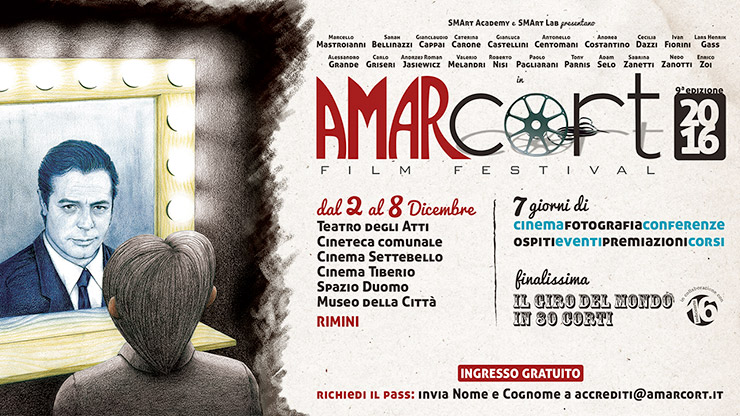
Short film contest
Winners 2016 edition
These are winners of Amarcort Film Festival 2016
Amarcort section

Best Movie 2016
The clockmaker's dream by Horgan Cashell
Per la ricreazione fantastica di una storia d'amore utilizzando elementi semplici ma di grande effetto visivo.
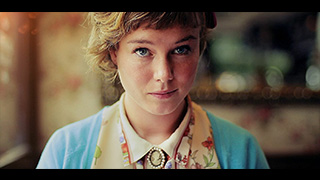
SMArt Academy Mention
Lila by Carlos Lascano
Nella semplicità l'autore è riuscito a portare lo spettatore in una dimensione fantastica con coerenza stilistica. Lila è una piccola poesia.
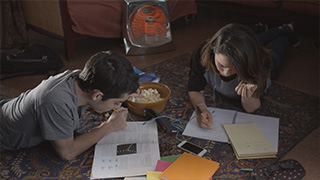
SMArt Academy Mention
Latchkey kids by Elad Goldman
Per il modo sensibile e sensuale con cui sono stati trattati sia gli attori sia l'argomento.
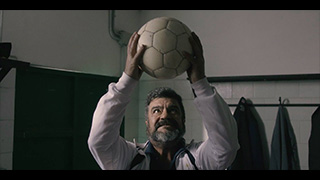
"Federico Fellini" Award
La partita by Frank Jerky
Un ritratto ironico, feroce e spietato, impreziosito dalle ottime interpretazioni degli attori e dal ritmo incalzante dei dialoghi, delle regia e del montaggio.
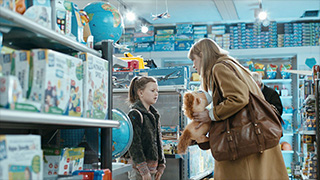
Critics Jury Award
Speechless by Robin Polak
Nel riconoscere una selezione di qualità molto elevata, tra cui ci piace ricordare almeno tre film quali "Bellissima", "Hyena" e "L'ours noire", premiamo la capacità di raccontare, in appena sei minuti con tutta la forza delle immagini a cui non necessitano parole, una storia intensa, drammatica ed emozionante, affrontata da un punto di vista inedito, delicato e coraggioso. Per uno sguardo non banale su una grande tragedia contemporanea, il premio della critica Amarcort 2016 va a "Speechless" di Robin Polak.
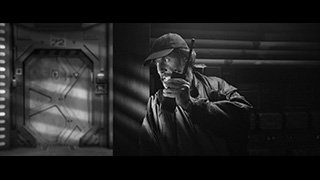
Youth Jury Award
They will all die in space by Javier Chillon
Per l'ambientazione e la tematica fantascientifica. Misurarsi con uno scenario del genere non deve essere stato facile ed apprezziamo il risultato finale. Interessante anche la scelta del bianconero che ha reso la fotografia nuova e tetra, come la sensazione che lascia il corto dopo la sua visione. Un misto tra inquietudine ed ansia.

Youth Jury Mention
Lila by Carlos Lascano
È stato votato principalmente per la tecnica con la quale è stato realizzato, la scelta di intrecciare e fondere il disegno con le riprese ha reso il corto diverso e nuovo. La protagonista principale è riuscita a riempire le scene senza dire neanche una battuta, parlando solo attraverso i suoi disegni, che trasportano lo spettatore in una visione diversa del mondo quasi fiabesca. Le sensazioni di pacatezza la luce brillante ed i colori prevalentemente caldi lasciano una sensazione piacevole al pubblico. Interessante anche la scelta di mostrare il potere quasi "magico" dell'arte, che diventa una vera e propria protagonista del corto.
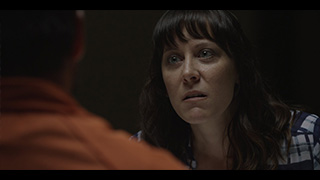
Youth Jury Mention
Hyena by Luca Elmi
Si è distinto per il suo carattere "crudo", la violenza non mostrata ma solo descritta genera sgomento ed ansia verso il "cattivo" della situazione. Questo almeno per la prima parte de corto. Nella seconda parte la scioccante violenza prettamente verbale, capovolge il punto di vista, spingendo lo spettatore a chiedersi chi sia davvero degno di essere chiamato "cattivo". Tematica interessante, di una velata violenza, tecnicamente impeccabile.
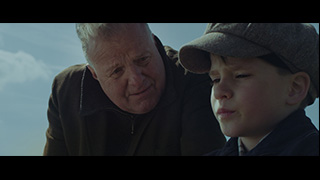
SMArt Academy Mention
The boy by the sea by Vasily Chuprina

"il Pataca" Award to Best Performance
Francesco Pannofino, actor in La partita by Frank Jerky and Djinn Tonic by Domenico Giudetti
Aldina section
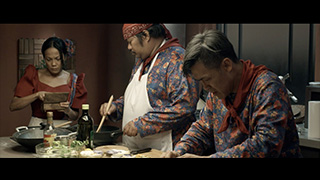
Best Short Movie of Category
La banda del catering by Matteo Gentiloni
Per aver saputo unire ritmo, recitazione, originalità nella trattazione del contenuto con una narrazione che ha in sé gli elementi di un possibile lungometraggio.
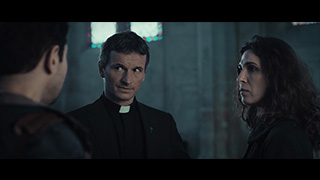
SMArt Academy Mention
La Preuve by Jonathan Lago Lago
Rex section

Best Short Animation Movie
Escargore by Olivert Hilbert
Per la capacità espressiva e tecnica dimostrata nel costruire un storia esilarante giocando ed ironizzando con i canoni del genere “splatter” con l’ausilio di semplici ed innocue lumache.
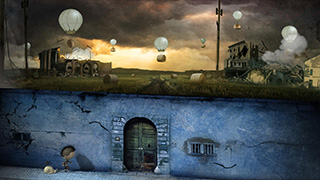
SMArt Academy Mention
The ballad of the homeless by Monica Manganelli
Film costruito con acuto gusto figurativo in un intelligente utilizzo di citazioni pittoriche per un racconto di forte impatto sociale, dedicato alle popolazioni colpite da eventi naturali (nello specifico il terremoto in Emilia Romagna del 2012) attraversato dal richiamo alla solidarietà.
Gradisca section
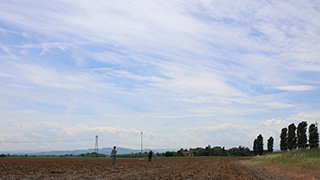
Audience Award
Il Tamaringo by Stefano Valentini, Alessio Pagliaro

SMArt Academy Mention
Savant: Kali 47 by Trip Hope
Fulgor section
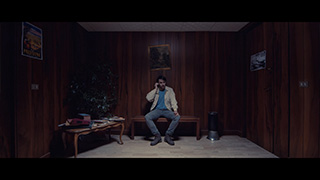
Best Short Movie of Category
Djinn Tonic by Domenico Giudetti
Gironzalon section
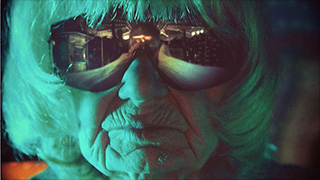
Best Short Movie of Category
Metube 2: August sings Carmina Burana by Daniel Moshel
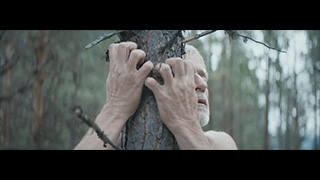
SMArt Academy Mention
The nordic sound by Christian Holm Glad
Around the world in 80 shorts section
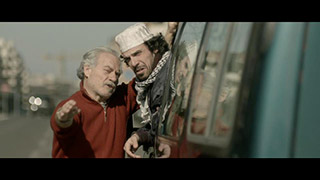
Audience Award
Ce l'hai un minuto? by Alessandro Bardani
Short film contest
Finalists 2016 edition
These are finalists movies of Amarcort Film Festival 2016
Amarcort
- Bellissima by Alessandro Capitani (Italy)
- The boy by the sea by Vasily Chuprina (Netherlands)
- The clockmaker's dream by Horgan Cashell (Ireland)
- Espagnol niveau by Guy Dessent (Belgium)
- Evviva l'arte! by Pawel Cichonski (Poland)
- Finché c'è vita c'è speranza by Valerio Attanasio (Italy)
- Hyena by Luca Elmi (Italy) world premiere
- Latchkey kids by Elad Goldman (Israel)
- Lila by Carlos Lascano (Argentina / Spain)
- La Malaerba by Mirco Valenza (Italy)
- The Maltese fighter by Arev Manoukian (Malta) italian premiere
- La Methode Greenberry by Baptiste Bertheuil (France)
- Nachtlicht by Samuel Flückiger (Switzerland) italian premiere
- L'orlo by Francesca Sambataro (Italy)
- L'ours noir by Xavier Seron, Méryl Fortunat-Rossi (France)
- La partita by Frank Jerky (Italy)
- Speechless by Robin Polak (Czech Republic)
- They will all die in space by Javier Chillon (Spain)
- Vardøger by Ludovic De Gaillande (France)
- Walking home by Max Richert (Germany)
- Zu ihrer eigenen Sicherheit by Florian Heinzen-Ziob (Germany)
Rex (animation short movies)
- Apple by Guanyu Li (China)
- The ballad of the homeless by Monica Manganelli (Italy)
- Can you decide by Lu Pulici (Italy)
- Derniere porte au sud by Sacha Feiner (Belgium)
- Ensamheten – Valsaland by Nicola Piovesan (Italy)
- Escargore by Olivert Hilbert (New Zealand)
- Especialidade da casa by Margarida Madeira (Portugal)
- I said I would never talk about politics by Aitor Oñederra (Spain)
- Life smartphone by Cheng Lin Xie (China)
- Lungomare by Daniele e Davide Ratti (Italy)
- Mijndert by Guido Franken (Netherlands)
- Natural novel in 8 chapters by Milen Vitanov (Bulgaria)
- Nocturnal Butterfly by Annika Dahlsten (Finland)
- Notorious Corn by Mallory Grolleau (France)
- Puzzle by Stav Levi (Israel)
- Robot love by Codrin Iftodi (Romania)
- Spesso viene sera by Paola Luciani (Italy)
- Tis by Saïd Hamich (France)
- Within by Natália Azevedo Andrade (Portugal)
Gradisca
- Absence by Rob Savage (United Kingdom)
- A Magician by Max Blustin (United Kingdom)
- Beyond by Manuele Mandolesi (Italy)
- Bovenkamer by André Maat (Netherlands)
- Cellfie by Panos Iliakopoulos (Greece)
- Dear Susie by Leopoldo caggiano (Italy)
- Fire, water, earth, air and time by Maria Reinhardt-Szyba (Germany)
- The First Smile by After Zahra Jafari (Iran)
- Guldklockan by Andreas Westerberg (Finland)
- Indios y Vaqueros by Emilia Ruiz (Spain)
- Jag Följer Dig by Jonatan Etzler (Sweden)
- Jasmin by Silvio Buchmeier (Switzerland)
- Je suis anonyme by Fabrice Coton (France)
- Nosztalgia by Vanessa Malheiros (Brazil)
- Savant: Kali 47 by Trip Hope (United States)
- Seios meus by David Murad (Brazil)
- Stripes by Tibo Pinsard (France)
- Il Tamaringo by Stefano Valentini, Alessio Pagliaro (Italy)
- Tiny winter circle by Beomsik Shim (South Korea)
Fulgor (short movies from Emilia-Romagna)
- 32 by Luca Baggiarini
- #IBambiniSperduti by Alessandro Benedetti
- Aurora by Alessio Fattori
- Centro Barca Okkupato by Adam Selo
- Djinn Tonic by Domenico Giudetti
- The Gold of the Tigers by Rodolfo Lissia
- Haze by Stefano Raspa
- Helena by Nicola Sorcinelli
- Il primo che passa by Martin P. Ndong Eyebe
Gironzalon (sperimental short movies)
- Aquarius di Timo Zhalnin (Russia)
- Dominio by Patricio Soto-Aguilar P. (Chile)
- The faces of night by Guido Franken (Netherlands)
- Fruit by Gerhard Funk (Germany)
- Jump by Taneli Törmä (Denmark)
- Lying women by Deborah Kelly (Australia)
- Metube 2: August sings Carmina Burana by Daniel Moshel (Germany)
- Negra by Fred Belchior (Brazil)
- The nordic sound by Christian Holm Glad (Norway)
- The Postmodern Pioneer Plaque by Boris Kozlov (Spain)
- Ruines du temps by Mathieu Peteul (France)
- War scarred Berlin by Roland Fuhrmann (Germany)
- Wrapped by Roman Kaelin (Germany)
- You will fall again by Alex Pachón (Spain)
Aldina (film schools students short movies)
- La banda del catering by Matteo Gentiloni (Italy)
- Betty by Kristiina Kello (United Kingdom)
- Blind date a la juive by Anaëlle Morf (Switzerland)
- Bogo the Clown by Greg Fox (Canada)
- Il campione by Jiang Boming (Italy)
- Eva by Florent Medina (France)
- Flying by Katharina Woll (Germany)
- Gute nacht by Henning Backhaus (Austria)
- La Preuve by Jonathan Lago Lago (Belgium)
- Obscurum di Frederic Garçon (Belgium)
- Sin tu latido by Maria Posada, Adrián Iglesias (Spain)
- The State is a Lady by Anna Gates (Germany / New Zealand)
Short film contest
Jury of Amarcort Film Festival 2016
GRAND JURY
Born in Kaiserslautern (Germany) in 1965.
Studied Literary Studies, Theatre Studies and Philosophy at the Freie Universität Berlin. His dissertation on the French writer and filmmaker Marguerite Duras was published under the title "Das ortlose Kino. Über Marguerite Duras" in 2001. In 1996/97 he was head of the European Institute of Documentary Film in Mülheim/Ruhr and editor of the series "Texts for the Documentary Cinema" and of the "DOX - Documentary Film Quarterly".
He has served as the director of the International Short Film Festival Oberhausen since 1997.
Author of numerous articles and essays on cinema, photography and cultural politics.
Various lectureships in Film and Cultural Management.
Co-editor of "Provokation der Wirklichkeit. Das Oberhausener Manifest und die Folgen" (2012) and author of "Film und Kunst nach dem Kino" (2012).
Festival director/producer.
Undertook film studies in Canada and produced and hosted Servizz Xandir Malti on Graham Cable TV in Toronto. Won four Graham Awards for drama in Maltese, Producer of the Year from Graham Cable Television and the Canada Birthday Award for Achievement (Government of Ontario).
In 1984 joined Xandir Malta Newsroom as editor/director. Later as Head of Drama of PBS directed and produced TV serials including "Dell mill-Imghoddi", "Enigma", "Ipokriti L-Armla ta' Wied Ix-Xtajta", "Kafe Chagal", "Nhar it-Tieg", "Il-Harba ta' Julian", "Rahal bla Ras", "il-Misteru tal-Bombli tal-Fuhhar", "IL-Madraggara" and various documentaries.
Wrote and directed "Operation White Dove" which was shown at the Ambassador Cinema, Valletta, on TVM and Australian (SBS) Television.
Directed "Bawxati The Movie", and "Pawlu ta' Tarsu" which were also screened at local Cinamas.
In 1990, he joined One Productions as head of drama, and produced and directed "Xowkeys", Shelly Rayner and "Stejjer ta' Wara t-Tmienja" and various award winning documentaries including "il-Qtil ta' Shqaqi".
As an independent director/producer for NET TV directed the second season of "It-Tfal Jigu Bil-Vapuri", "The Inheritance", "Marcellino and Scrooge".
Won several Broadcasting Authority Awards for Drama and documentaries as well as the BPC Award to Journalism (TV). Also, won the award for Best Cultural Programme with Joyce Grech for the production of the Malta International TV Short Film Festival aired on TVM.
Served as judge on several film festivals, including the Short-Shock 2007 International Film Festival in Anapa, Russia, and The Golden Knight Film Festival in Malta (Malta Cine Circle) and the Malta Journalist Awards.
President of the Jury Shortini International Film Festival, 2015.
Tony is the Festival director/producer of The Malta International TV Short Film Festival, also co-produced with Joyce Grech.
2015 Directed documentary "Paulus The Shipwreck 60 A.D.".
Producer, writer, director.
He attended Wroclaw Univeristy, Adam Mickiewicz University, the High School of Theatre, Warsaw and Sorbonne in Paris.
He took his Degree in Humanities.
He first worked as Assistant in theater and television in Poland and France, where he was an assistant to Jean-Louis Barrault at Theatre de France in Paris.
He directed Harold Pinter's "The Lover" in Poland, his first independent stage production, then he worked as Director/Director of Photography on the documentary "Dona Felicia", the first of several documentaries shot in Europe, USA and Latin America. He was 2nd unit director on "River of Diamonds" with locations in Brazil, Argentina and Uruguay, a Universal City Studios production.
As Producer/Director he made numerous supporting films for release by United Artist, CIC and Rank Film Distributors. He is the Founder Member of the Polish-British Film Foundation for Young Audiences, based in Poland and the U.K.
He directed many promotional and advertising films. With G.F.Newman, he wrote "To Rio for Love", which he also directed starring Linda Collins and Geraldo del Rey.
There followed "Winter Story" (producer and director), GTO Films, London; "Francis Lai - the man and his music" (director), Eagle Films, London; series for children "Stories from the Old City" (director and writer) with Lilian de Arias, TVP Warsaw, Amber Films London, Prime Time, New York; "The Circus Connection" (producer and director), British, Polish, Swiss co-production.
He has written, alone or with others, several scripts including "An Order to Kill", "Dead Center", "Venetian Mirror", "The Last Shot", "Amorous Adventures of Chevalier de Faublas", "The Ice Maiden" based on the book of Hans Christian Andersen.
He is a member of Society of Authors & Composers, Warsaw, Performing Rights Society in London, the Association of Polish Filmmakers in Warsaw and BCTU in London, also Member of Film Expert Group at the Polish Film Institute.
He organizes cineforum activities, and film literacy.
Since 2004, he has been Artistic Director of the Forlì International Film Festival SEDICICORTO.
In 2008, he promotes FEDIC D'ORO, a circuit involving 12 Festival and 30 Cineclub.
In 2009, he is appointed Director of FEDIC (Italian Federation of Cineclubs).
Since 2011, he has been Artistic Director of ANIMARE Festival of Cesenatico.
In 2013, he promotes international network EUROSHORT involving nine European countries.
Since 2014, he is representative of REFF circuit (Network Fedic Festival), that includes 15 Italian Festival.
He is part of the Committe that promotes the CNC (National Short Film Centre).
He has participated as a juror and selector to various National and International Festival.
He collaborates with several Italian and International Festival to promote the network of distribution for the short film.
Andrea Costantino is a screenwriter, director, editor.
He's sole director of AncheCinema Srl. which deals with production and distribution. After the great success in cinemas and distribution of the short film "Sposerò Nichi Vendola" ("I'll marry Nichi Vendola"), AncheCinema Srl launched a project even more ambitious.
A distribution project aimed to give dignity and market to stories that can be told simultaneously in literary form, with a limit of 300 pages, and film, through the format of shorts.
It was an innovative initiative that connects the traditional publishing world to an app for the distribution of short films for smartphones and tablets.
He received a special mention for the original subject by the Sindacato Nazionale Giornalisti Cinematografici Italiani (National Union of Italian Film Journalists) for Nastro D'Argento short films and documentaries in 2004.
The award was for to the short film "Il Provino” ("The Audition").
"Il Provino" has received tilll today 32 national and international awards as well as numerous selections and projections.
In 2008 he received, as author and producer, financing for the realization of the short film entitled "Sposerò Nichi Vendola" by resolution of the Sottocommissione Cinema-Section for the recognition of cultural interest for the shorts (meeting of 15 December 2008).
In 2006, thanks to the writing of the film "Falla Finita" he won the financing set up by the Ministry of Cultural Heritage in the section for the recognition of cultural interest of the first works for the realization of the project.
From 2001 to 2006 he worked in national film as assistant editor and assistant director. He attended several workshops for writing, photography and editing with professionals like Giuseppe Tornatore.
He collaborates with other important professionals like Alessandro D'Alatri, Osvaldo Bargero, Enrico and Carlo Vanzina.
Since 2001, as the owner of a sole proprietorship, he produces commercial spots, documentaries and videos for art exhibitions, companies, government agencies and broadcasters.
He has worked on several short films: "Dove ci porta la corrente" by Fabio Baccelliere, "Sali e Tabacchi" by Fabio di Credico and Tommy Di Bari, "L'Oro Rosso" by Cesare Fragnelli as editor.
Roberto Nisi lives in the US where corresponds to the digital magazine film Rapporto Confidenziale and selects films for Sicily Queer Festival.
Over the years he was artistic director of the festival Corto Dorico, he has conceived and organized projects such as Conero Doc Campus and Cineresidenze, and co-wrote the documentary "Dalla Testa ai Piedi" and "Una Nobile Rivoluzione" directed by Simone Cangelosi.
He also directed the documentary short film "Live in Sferisterio" and is developing the film "A Genetic Abbreviation".
Shared between family, cinema, theater, journalism, music and poetry, Enrico Zoi, born in Florence in 1959, degree in Letters on the '500 and has written a large number of books, including two poetry anthologies: "Perle perline giù per la scarpata"(1985) and "L'angelo Lombrico" (2011).
He also has written more than 25 years of press releases and published thousands of articles, reviews and interviews.
With Philippe Chellini, he is the film biographer of Alessandro Benvenuti and wrote the book that tells the twentieth anniversary of the "Cyclone" by Leonardo Pieraccioni.
Zoi is vice president of the Tuscany Librarian, Journalists- writers Association.
Journalist and film critic, has to his credit the publication of several books and essays on cinema.
President of CinemaItaliano.info, creator of the project of Agenda del Cinema in Turin, he conducts specialized services on cinema on local radio and TV.
He organized, co-organized, worked and selected for Seeyousond Film Festival - Torino, Mostriamo il Cinema - Cervo (IM), VIEWFest and View Conference – Torino.
He founded Rimini Film Library, organised and directed many events and international festivals, and wrote a large number of articles, essays, and books about cinema: his last book "Le radici di Fellini romagnolo del mondo" was published only two months ago.
Born in 1967, graduated in Philosophy, he has been working at Rimini Film Library since 1997.
Graduated in Film Studies at University of Parma, he takes care of Federico Fellini archives in Rimini.
He has collaborated with different magazines and art centres, writing reviews and essays, and doing research.
Ha has worked for many years in the publishing industry.
Born in Rimini in 1963, graduated in sociology with a specialization in mass communications and a master's thesis on animation films.
From 1990 she has been working in the field of social research, particularly on issues such as juvenile disadvantage, intercultural disciplines and mass media.
She is an expert in cinema and mass communications and has worked extensively in various cultural activities of the city of Rimini, collaborating on the organization of a large number of events dealing with music, film and visual arts.
Since 1991 she has been taking care of the ACLI Rimini cultural activity,from the association activities (music clubs, dance, theater, photography and movie culture) to "Progetto Immagine", a special project including various activities and events dedicated to the world of communications.
In 1984 she organizes two video-film events and since 1991 she becomes their Artistic Director:
"Round - Video film festival for short films, dedicate to independent authors" (1984/2012).
"Cartoon Club - International Festival of animation, comics and games".
Since 1999, she's been organizeing activities and cultural events for the detained of the Prison of Rimini.
From 2000 to 2008 she has been president of the ACLI of Rimini Province.
From 1999 to 2009 she has coordinated the activities of the Social Services of the town of Verucchio.
From 2001 to 2003 she has coordinated the activities of the Culture of the Municipality of Riccione.
From 2005 to 2013 she has been president and director of "Foundation Enaip S. Zavatta" which organizes training courses and social activities.
From 2008 to 2013 she has been managing director of CO.AP. Cooperativa Comunità Aperta a.r.l. that manages radio channels, TV and web in the Rimini province.
In 1998, together with the musician Andrea Felli of Acanto Snc, she founded a sound research center located in Rimini which includes a professional recording studio called Farmhouse, a recording label and music publishings.
Even though he was born in Ferrara in 1936, he his considered a real native of Rimini.
His passion for cartoons became his job.
As a surveyor he began to draw and at the age of 23 he joined EDISON CHIMICA dealing with business communication.
Five years later in 1964 he joined FILMITALIA.
In a very short time he became one of the first authors of CAROSELLO, among the pioneers of marketing and storytelling, making hundreds of advertising spots and documentaries.
Besides his professional activity, he felt the need to make short movies, free from commercial constraints, in order to experiment and to alternate different techniques.
In 1965 he made his first short cartoon "Il Cedolino della Speranza", followed by "Water", "Naufraghi", "Patatrac" as cartoon, "Un Uomo Sbagliato", "Alfabeat" with decoupage, "Il Burosauro" in pixillation, "Abbasso il Tiranno" with playdough and Lego bricks, "www.popper" with mixed technique.
His latest works are in digital: he starts using Flash and makes "Africa patchwork", "Il pesciolino d'oro", "Vintage", "Milano canta", "La ruota", "Art: 18", "Femmine fatali".
The 2D computer animation is his umpteenth media of experimentation and his last experience are some animation for the theatrical performance "Planets".
He also dealt with education: together with Massimo Maisetti he wrote "A Scuola con il Cinema di Animazione" and from 1985 to 2010 he held classes on cartoon film at the Department of Illustration of the European Design Institute of Milan (IED).
He co-operated with several schools holding classes for students and teachers in many Italian cities.
He also completed educational documentaries on techniques and tricks for animation movies to help his teaching career.
Paolo Pagliarani was born 1963, on May 8th, in Rimini, where he lives in Borgo San Giuliano, a few steps from the Cinema Tiberio, where he provides his organizative and artistic help to manage the cinema together with volunteers of the parish of San Giuliano Martire.
Since 1984 he has been the film critic of the weekly "Il Ponte" in Rimini and has collaborated with "Il Resto del Carlino", "La Gazzetta di Rimini", "Il Corriere di Rimini", "La Voce di Romagna", "Radio Icaro" and "Kursaal".
From 1991 to 2001 he has been the owner of the Press Agency Telegraphica, with whom he has worked in the field of press offices, with particular attention to the cultural, artistic and show events; he then continued as a freelancer in the same sector with prestigious collaborations for Sagra Malatestiana Music Festival, Cartoon Club Festival, Teatro Ermete Novelli in Rimini, Arboreto in Mondaino, Palio del Daino in Mondaino, Verucchio Music Festival and many other important national events.
Since 1996, he's been offering courses on cinematographic language for the schools in Rimini, besides a series of conferences about cinema. In collaboration with Notorious Rimini Cineclub he organized the event "Cinema under the stars" and the film festivals "La Vela Illuminata" and "Tiberius CinePicnic" in Rimini.
"Around the world in 80 short films"
2016 Edition
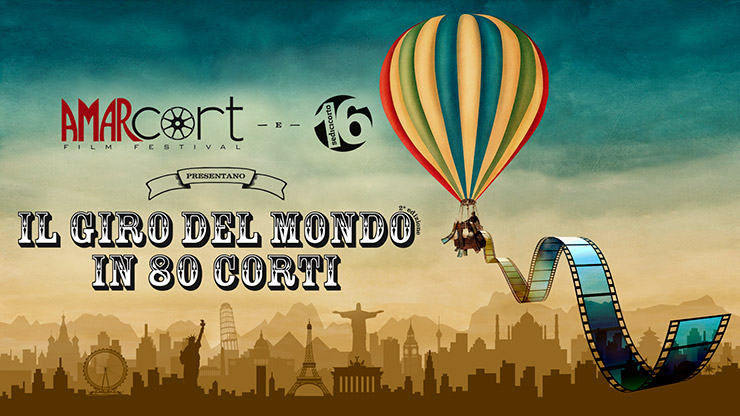
These are finalists and winner of "Around the world in 80 short films", 1st edition
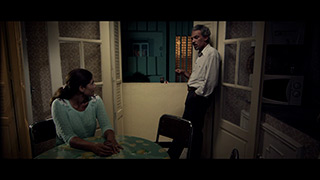

Title: Père
Author: Lotfi Achour
Country: Tunisia / Francia
Year of production: 2014


Title: Great
Author: Andreas Henn
Country: Germania
Year of production: 2013


Title: Ce l'hai un minuto?
Author: Alessandro Bardani
Country: Italia
Year of production: 2014
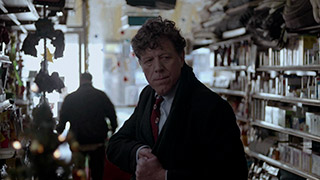

Title: All the pain in the world
Author: Tommaso Pitta
Country: Regno Unito
Year of production: 2014

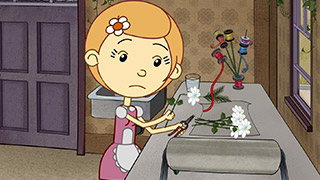
Title: The Florist
Author: Gazizov Rinat
Country: Russia
Year of production: 2015

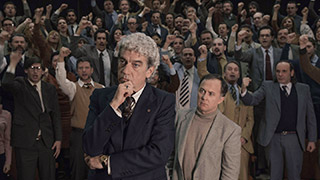
Title: Democracia
Author: Borja Cobeaga
Country: Spagna
Year of production: 2013


Title: Au sol
Author: Alexis Michalik
Country: Francia
Year of production: 2014

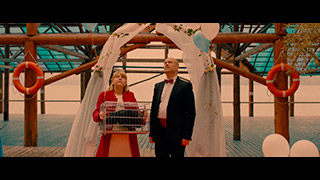
Title: The Rooster
Author: Aleksey Nuzhny
Country: Russia
Year of production: 2015


Title: Getting fat in a healthy way
Author: Kevork Aslanyan
Country: Germania / Bulgaria
Year of production: 2015
Scripts Contest
Winners 2016 Edition
These are winners of Scripts Contest "Grand Hotel", 3rd edition

Miglior sceneggiatura
A little bullet di Daniele Esposito
La soggettiva di una pallottola difettata in un mondo di armi perfette, la rende vivente come una coscienza palpitante all'interno di un essere umano.
Una carrellata di eventi storici, appena accennati, danno l'idea dei vili soprusi perpetrati su esseri umani da strumenti di morte creati dai suoi simili. Una vera e propria scala gerarchica dell'orrore tra armi di differente utilizzo. Questi sono alcuni temi di: "A little bullet", il cortometraggio di animazione che vince il premio Amarcort 2016.
Pensare che la natura di qualcosa sia la violenza è già contro natura. Ma la piccola pallottola inverte il senso compiuto delle cose e con la sua determinazione pacifista porta altre armi dalla sua parte, rifiutandosi di agire per lo scopo per cui è stata costruita. La geniale idea di bypassare la retorica sulla violenza creando un nuovo inedito punto di vista in cui ogni cosa ha una sua anima e capacità di scelta, rende questo cortometraggio un piccolo capolavoro che fa riflettere sul proprio potere personale.

Menzione Speciale
Che fine ha fatto l'ignoranza di Delio Colangelo
Dissacrare e capovolgere alcuni dei problemi più comuni della disabilità, ha in sé il grande potenziare di puntarvi addosso il riflettore dell'attenzione comune e, speriamo, condivisa. Il cortometraggio è un inno alla capacità di trasformare qualsiasi situazione in un trampolino di lancio di fronte a una vera spinta. Lontana dal buonismo e vittimismo con cui spesso si toccano tali delicati argomenti, questa sceneggiatura strappa un sorriso canzonatorio a tutti coloro che guardano il mondo dei disabili con un tocco di pietà.

Menzione Speciale
Il colore del buio di Luca Mastrogiovanni
Luca Mastrogiovanni con la sua sceneggiatura "Il colore del buio", scava in pochi minuti nell'animo di un ragazzo non vedente, immergendo lo spettatore, con cautela, nella sua stessa condizione visiva ed esistenziale senza pietismo o vittimismo, ma con intelligenza e originalità. Man mano che avviene questo percorso di conoscenza attraverso una telefonata tra due sconosciuti, Omero e Olimpia, lo spettatore assiste al buio e con discrezione, alle battute perfettamente costruite dei due personaggi, e ne finisce per restare catturato, cosi come la ragazza, dal bisogno di non "vedere" la diversità attorno a noi.
Scripts Contest
Finalists 2016 Edition
These are finalists scripts
- A little bullet by Daniele Esposito
- Balbùz by Renato Quittan
- Che fine ha fatto l'ignoranza by Delio Colangelo
- Ciao amico by Stefania Serio
- Dentro by Sebastiano Sacco e Nicola Pellino
- Due minuti by Anna Maria Pesaresi
- Il colore del buio by Luca Mastrogiovanni
- Incontro by Annamaria Orlando
- La chiave del Paradiso by Marina Confalone
- La vita di un'altra by Silvia Torani
- Ma oggi è dopo la guerra. Vero? by Laura Allegrini
- Mary - Una storia vera by Lorenzo Righi
Scripts Contest
Jury of "Grand Hotel" 2016 Edition
Nel 1989 si trasferisce a New York dove studia recitazione con Herbert Bergof, successivamente diventa assistente di Carmelo Bene.
Molteplici le sue interpretazioni, dal cinema:
- 2013 - "Bianca come il latte, rossa come il sangue" – regia di G. Campiotti;
- 2012 - "La Legge di Jennifer" – regia A. Capitani;
- 2011 - "Habemus Papam" – regia N. Moretti;
- 2011 - "Questo mondo è per te" – regia F. Falaschi;
- 2011 - "The rite" – regia M. Hafstrom;
- 2010 - "L'uomo dei sogni" – regia A. Capitani e A. Mascia;
- 2010 - "Scusa ma ti voglio sposare" – regia F. Moccia;
- 2010 - "Sharm el Sheikh – Un'estate indimenticabile" – regia C. Vanzina;
- 2009 - "Feisbum" – regia D. Giarrusso, A. Capone, G. Rolandi, E. Sana, S. Murri, L. Luchetti, M. Mancini;
- 2008 - "Scusa ma ti chiamo amore" – regia F. Moccia;
- 2007 - "Voce del verbo amore" – regia A. Manni;
- 2006 - "Wimbledon" – regia R. Loncraine;
- 2006 - "Il Caimano" – regia N. Moretti;
- 2005 - "La scarpa" – regia A. Rovetta;
- 2004 - "Movimenti" – regia C. Fausti, S. Murri;
- 2004 - "Ogni volta che te ne vai" – regia D. Cocchi;
- 2003 - "Bell'amico" – regia M. Bartolomeu;
- 2002 - "Emma sono io" – regia F. Falaschi;
- 2001 - "Caruso, zero in condotta" – regia F. Nuti;
- 2000 - "Le sciamane" – regia A. R. Ciccone;
- 2000 - "Un colpo al cuore" – regia A. Benvenuti;
- 1999 - "Matrimoni" – regia C. Comencini;
- 1997 - "Il mastino" – regia F. U. Gioradni e F. Laudadio;
- 1996 - "La classe non è acqua" – regia C. Calvi;
- 1996 - "Un inverno freddo freddo" – regia R. Cimpanelli;
- 1995 - "Il cielo è sempre più blu" – regia A. Grimaldi;
- 1995 - "L'ombra abitata" – regia M. Mazzucco;
- 1995 - "Trafitti da un raggio di sole" – regia C. Del Punta;
- 1994 - "Giacobbe" – regia P. Hall;
- 1994 - "Miracolo italiano" – regia E. Oldoini;
- 1986 - "La famiglia" – regia E. Scola;
alla televisione:
- 2015 - "Una pallottola nel cuore 2" – regia L. Manfredi ruolo Giada;
- 2014 - "Il tredicesimo apostolo" – regia A. Sweet prot puntata 2014;
- 2014 - "La bella e la bestia" – regia F. Costa 2014;
- 2009 - "L'ispettore Coliandro" – regia Manetti Bros;
- 2008 - "Amiche mie" – regia P. Genovese, L. Miniero;
- 2007 - "Caccia segreta" – regia M. Spano;
- 2007 - "La squadra 8" – registi vari;
- 2007 - "Boris" – regia G. Ciarrapico, M. Torre, L. Vendruscolo;
- 2006 - "L'ispettore Coliandro" – regia Manetti Bros;
- 2004 - "O la va, o la spacca" – regia F. Massaro;
- 2001/2000 - "La squadra 1" e "La squadra 2" – registi vari;
- 1996 - "Dio vede e provvede" – regia E. Oldoini;
- 1991 - "I ragazzi del muretto" – regia G. Calderone, R. Deodato, L. Gasparini, G.Lazotti, P. Poeti, R. Roberti, N. Salerno, T. Sherman;
per la pubblicità:
- 2009 - "Aism – In prima Linea";
- 2007 - "Lotta All'AIDS" (Campagna ministeriale) – regia F. Archibugi;
- 2007 - "Peopling The Palaces At Venaria Reale" – regia P. Greenaway;
- 2005 - "Dentro Roma" – regia F. Costabile;
- 2005/2003 - Testimonial "CARTE D'OR" – regia P. Genovese e L. Miniero;
spaziando anche nel mondo del cortometraggio:
- 2015 - "Stella 1" – regia G. Bonsignore e R. d'Ippolito;
- 2011 - "La casa di Ester" – regia S.Chiodini;
- 2008 - "Amiche" – regia M. Natale;
- 2008 - "L'amore è un gioco" – regia A. Rovetta;
- 2007 - "A piedi nudi sul palco" – regia A. Rovetta;
- 2007 - "Non vedo l'ora di giocare" – regia G. Mondadori;
- 2007 - "12 Renne" – regia A. Rovetta;
- 2005 - "Dalla finestra aperta" – regia F. Falaschi;
- 2005 - "La Locandiera" – regia M. Panici;
- 2004 - "La Scarpa" – regia A. Rovetta;
- 2004 - "Sotto le foglie" – regia S. Chiodini;
- 2003 - "Cronaca Rosa" – regia S. Girolami;
- 2002 - "Il Naso Storto" – regia A. Ciano;
- 2002 - "Emergency" – regia A. Panini;
- 2002 - "Cassa Veloce" – regia F. Falaschi;
- 2001 - "Se Mi Mordi Grido" – regia G. Carrassi;
- 2000 - "Pasta Girl" – regia A. Panini;
- 2000 - "AA Agenzia Abbandoni" – regia L. Facchini;
- 1997 - "Gioco di squadra" – regia C. Del Punta;
- 1997 - "Mirko e Caterina" – regia C. Calvi;
Numerosi i premi vinti, fra i quali:
- 2013 - Toronto, Lakeshorts International Film Festival, miglior interprete per "La casa di Ester";
- 2013 - Miglior attrice ai "Corti d'Argento" per "La Legge di Jennifer";
- 2002 - Premio Flaiano e Premio Gallio come Migliore attrice protagonista per il film "Emma sono io";
- 1999 - David di Donatello Migliore Attrice non protagonista per "Matrimoni";
- 1997 - Festival di SanRemo, autrice brano "Capelli" con cui Niccolò Fabi vince il premio della critica.
Ivan Fiorini è nato a Rimini nel Marzo del 1972, ma ormai da tempo vive a Roma.
È stato il più giovane organizzatore di cinema italiano.
Il primo film è del 1993. Nel 2000, come organizzatore generale, inizia la sua collaborazione con la società Fandango. Da lì numerosi film ed esperienze professionali continuando la sua carriera da free-lance e lavorando anche con altre società del settore. Questi i film che più ama ricordare: "Da zero a dieci" di Luciano Ligabue, "La passione" di Carlo Mazzacurati, "Lo spazio bianco" di Francesca Comencini, "L'Oriana" di Marco Turco, "La pazza gioia" di Paolo Virzì, "Smetto quando voglio Saga" di Sydney Sibilia.
Alessandro Grande nasce a Catanzaro nel 1983, è un regista e sceneggiatore cinematografico. Dottore Magistrale in Storia, Scienze e Tecniche dello Spettacolo, presso l'Università di Tor Vergata con votazione 110/110 e menzione di lode. Si specializza in regia cinematografica e frequenta diversi seminari e stage tra i quali quello diretto da Aurelio Grimaldi in "Regia e sceneggiatura cinematografica".
Docente stage biennio 2015/16 in regia e sceneggiatura cinematografica per gli stage FEDIC (Federazione italiana Cineclub) con la partecipazione del Mibact. Molto attivo nel campo del cortometraggio, sia come produttore che come regista e sceneggiatore. Ha vinto il Premio Speciale Alice al David di Donatello con il corto spot dal titolo "Pena. Esclusione di vita", opponendosi alla pena di morte. È entrato nella cinquina finalista dei 69° Nastri d'argento con il suo ultimo cortometraggio "Margerita".
Ha raggiunto la notorietà nel circuito dei cortometraggi nel 2010 con "In my prison", presentato come unico lavoro breve al Roma Fiction Fest (2010) e ottenendo in seguito oltre 100 selezioni ufficiali in tutto il Mondo e oltre 40 riconoscimenti, tra i più importanti: il Premio Amnesty International, Premio L'Anello Debole, Premio del Pubblico Corto Tokyo (Giappone), il Premio Fandango Film. Ha rappresentato inoltre l'Italia nei maggiori festival internazionali: Jordan Film Fest (Giordania), Detmold International short Film Fest (Germania), Budapest Film Fest (Ungheria), 24fps Film Festival (Texas), La boca del Lobo (Spagna), Thess Short Film Fest (Grecia), The Eko Film Fest (Malesia).
Il 22 dicembre 2012, per il trentennale dell'associazione Calabresi nel Mondo, gli viene conferito il Premio Calabria Mondo, in riconoscimento degli alti meriti conseguiti con la sua attività cinematografica che tiene alto il prestigio dei Calabresi nel Mondo.
Nel 2013 presenta "Margerita" al 43° Giffoni Film Festival. Nel cast del nuovo lavoro che affronta la delicata questione dell'integrazione, Moni Ovadia, Francesca Valtorta e un gruppo di rom non professionisti. In soli dodici mesi di distribuzione, ha all'attivo 78 premi, tra i quali: Premio Miglior Film all'11° Ischia International Film Festival, Premio Miglior Regia all'8° Cyprus International Film Festival, Premio Miglior Post-Produzione al 18° Canberra Short Film Festval, e le selezioni ufficiali nei maggiori festival del Mondo: New York, Budapest, Marbella, Pakistan, Mumbai, Tolosa, Montreal, Isle of Wight, Ohio, Corinthia, Seul, fino a rientrare nei primi sei classificati con la Nomination Miglior film al Twain HarteCalifornia.
Alessandro Grande per i traguardi ottenuti, partecipa alla rassegna "Cinemi e Cinema 2013", realizzata in collaborazione con la 50^ edizione della Mostra Internazionale del Cinema di Pesaro, considerato uno degli otto giovani talenti italiani.
Attualmente "Margerita" è in distribuzione con la società tedesca Interfilm Berlino, è rientrato nella cinquina finalista alla 69^ edizione dei Nastri D'argento, ha vinto il Premio Federico Fellini, è diventato un corto F.I.C.E., distribuito in 450 sale cinematografiche d'essai e da dicembre 2014 è in programmazione sulla rete televisiva Diva Universal.
Nel giugno del 2016 realizza per la Fondazione Lice, un film documentario con al centro la storia di due persone, Francesco e Lucrezia, entrambi affetti da disturbi diversi di epilessia e con un obiettivo che devono raggiungere nella loro vita quotidiana.

